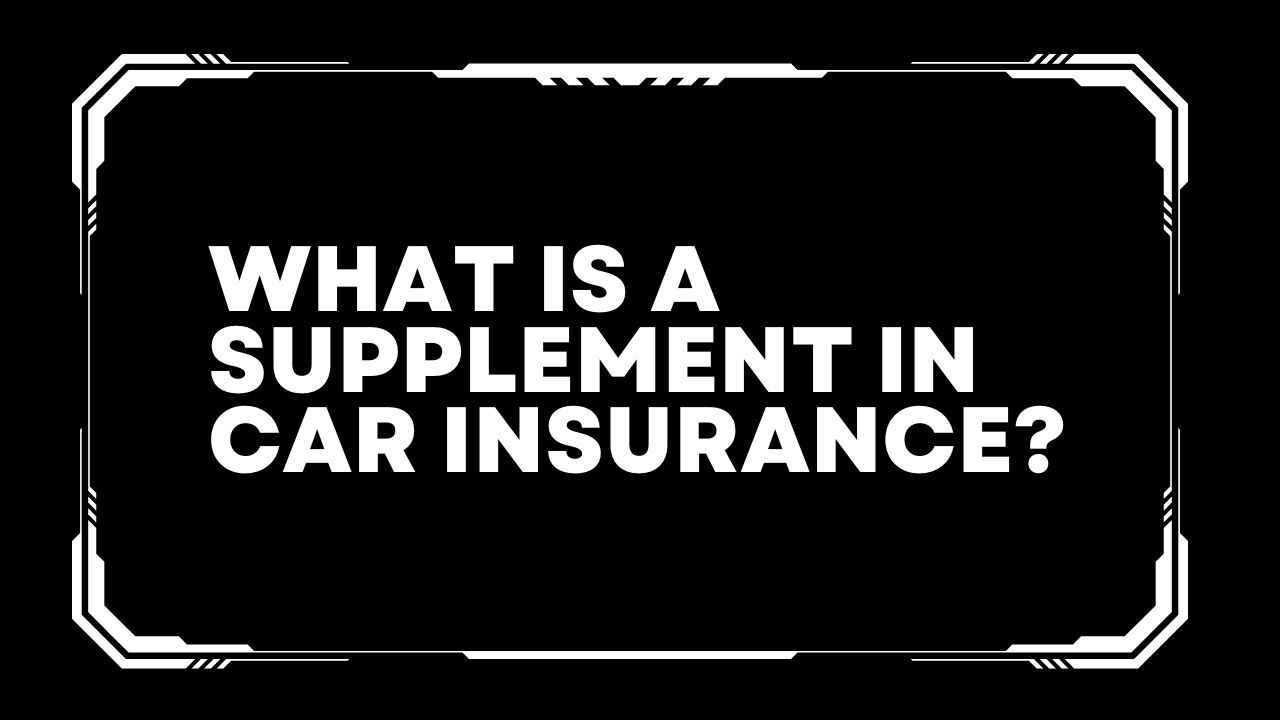Home>Finance>When Is A Medicare Supplement Insurance Consumer Subject To Underwriting


Finance
When Is A Medicare Supplement Insurance Consumer Subject To Underwriting
Published: November 22, 2023
Learn about when a Medicare supplement insurance consumer needs to go through underwriting process and how it relates to personal finance.
(Many of the links in this article redirect to a specific reviewed product. Your purchase of these products through affiliate links helps to generate commission for LiveWell, at no extra cost. Learn more)
Table of Contents
- Introduction
- Definition of Medicare Supplement Insurance
- Overview of Underwriting
- Factors that Trigger Underwriting
- Age Requirements for Underwriting
- Health Conditions that May Require Underwriting
- Automatic Issue Rights
- Medigap Guaranteed Issue Periods
- Other Circumstances that May Trigger Underwriting
- Conclusion
Introduction
Medicare Supplement Insurance, also known as Medigap, is a type of insurance coverage designed to help fill the gaps in Original Medicare. While Original Medicare covers many healthcare costs, it doesn’t cover everything, leaving beneficiaries responsible for coinsurance, deductibles, and other out-of-pocket expenses. Medicare Supplement Insurance plans help cover these additional costs, providing beneficiaries with greater financial protection and peace of mind.
However, unlike Original Medicare, which is available to all eligible individuals, Medicare Supplement Insurance plans may require underwriting for certain applicants. Underwriting is the process by which an insurance company evaluates an applicant’s health status and medical history to determine coverage eligibility and pricing.
In this article, we will explore when a Medicare Supplement Insurance consumer may be subject to underwriting and the factors that can trigger underwriting requirements. We will also discuss age requirements and specific health conditions that may impact underwriting decisions.
It’s important to note that not all consumers seeking Medicare Supplement Insurance will be subject to underwriting. There are situations where individuals have guaranteed issue rights or are in a guaranteed issue period, which exempts them from underwriting requirements. We will also discuss these scenarios and help you understand if you qualify for automatic issue rights or a guaranteed issue period.
Understanding when you may be subject to underwriting and the factors involved can help you navigate the process and make informed decisions when choosing a Medigap policy. So let’s dive in and explore the world of Medicare Supplement Insurance underwriting.
Definition of Medicare Supplement Insurance
Medicare Supplement Insurance, also known as Medigap, is a private insurance policy designed to supplement Original Medicare coverage. It helps pay for out-of-pocket costs such as deductibles, coinsurance, and copayments that Medicare does not fully cover.
Medigap policies are offered by private insurance companies and are standardized by the federal government, meaning that each plan with the same letter designation (e.g., Plan F, Plan G) provides the same basic benefits, regardless of the insurance company you choose. This allows beneficiaries to compare policies and choose the one that best fits their needs.
Medicare Supplement Insurance policies generally only cover one person, so if you and your spouse both want coverage, you will each need to purchase separate policies.
It’s important to note that Medigap policies do not cover services not covered by Original Medicare, such as dental care, vision care, hearing aids, or long-term care. For these types of services, you may need to consider additional insurance coverage or alternative options.
Medicare Supplement Insurance policies can provide beneficiaries with greater financial security by reducing or eliminating Medicare’s cost-sharing requirements. This can help protect against unexpected and high medical expenses, giving peace of mind to those enrolled in Original Medicare.
Overview of Underwriting
Underwriting is the process by which insurance companies assess an applicant’s health status and medical history in order to determine coverage eligibility and pricing for Medicare Supplement Insurance. During underwriting, the insurance company evaluates an individual’s risk factors, including pre-existing conditions, to determine their likelihood of requiring healthcare services and the potential costs of providing coverage.
The purpose of underwriting is to protect the financial stability of the insurance company and ensure that premiums and coverage are appropriate based on an individual’s health status. This helps maintain the sustainability of the Medigap insurance market and prevents individuals from waiting until they are sick or in need of expensive medical care to enroll in a Medigap policy.
Insurance companies use various tools and techniques to assess an applicant’s health status. They may review medical records, ask detailed health-related questions, request medical exams or tests, or use data from prescription drug databases. The underwriting process can vary between insurance companies, but the objective is always to determine an accurate risk assessment.
It’s important to note that underwriting for Medicare Supplement Insurance is typically conducted when an individual is initially applying for coverage. Once a policy is issued, the insurance company cannot cancel the policy due to changes in health status or medical conditions. This provides beneficiaries with the security of knowing that their coverage will not be revoked due to worsening health.
However, it’s crucial to understand that if you decline Medicare Supplement Insurance when it is initially offered during your Medigap Open Enrollment Period (OEP), and you later try to enroll in a policy outside of your OEP, the insurance company may require medical underwriting, which could result in higher premiums or even denial of coverage based on your health.
Overall, underwriting plays a critical role in the Medicare Supplement Insurance market by ensuring fairness in pricing and maintaining the financial stability of insurance companies. By understanding the underwriting process, individuals can make informed decisions about their coverage options and plan for any potential requirements or limitations based on their health status.
Factors that Trigger Underwriting
Not all individuals applying for Medicare Supplement Insurance will be subject to underwriting. Certain factors can trigger the need for underwriting, which involves assessing an applicant’s health status and medical history. Here are some common factors that may trigger underwriting:
- Age: Generally, insurance companies cannot deny coverage or charge higher premiums based on age when an individual is within their Medigap Open Enrollment Period (OEP), which lasts for six months starting the first day of the month in which they turn 65 and are enrolled in Medicare Part B. However, if an individual applies for a Medigap policy outside of their OEP, age can be a factor that triggers underwriting.
- Health Conditions: Pre-existing health conditions can trigger underwriting for Medicare Supplement Insurance. Insurance companies may request detailed information about an applicant’s medical history, including past diagnoses, surgeries, or ongoing treatments. Certain health conditions may result in higher premiums or denial of coverage, depending on the insurance company’s underwriting guidelines.
- Tobacco Use: Insurance companies can consider tobacco use as a factor in underwriting for Medicare Supplement Insurance. Smokers or individuals who use tobacco products may be subject to higher premiums.
- Previous Coverage: If an individual is applying for Medicare Supplement Insurance after their Medigap Open Enrollment Period or after a guaranteed issue period, they may be subject to underwriting. Insurance companies may review an individual’s prior coverage and determine if there was a lapse in coverage before considering their application.
It’s important to note that underwriting requirements and guidelines can vary among insurance companies. While one company may approve an application, another company may consider the same factors as grounds for denying coverage or increasing premiums. Therefore, it’s advisable to compare multiple insurance companies and their underwriting guidelines to find the best option for your specific situation and health conditions.
Understanding the factors that might trigger underwriting can help individuals assess their eligibility and make informed decisions about applying for Medicare Supplement Insurance. By being aware of these factors upfront, individuals can plan accordingly and potentially avoid unnecessary challenges during the underwriting process.
Age Requirements for Underwriting
Age can be a significant factor in determining whether an individual will be subject to underwriting when applying for Medicare Supplement Insurance. Generally, insurance companies cannot deny coverage or charge higher premiums based on age when an individual is within their Medigap Open Enrollment Period (OEP). However, age can play a role outside of the OEP.
During the Medigap Open Enrollment Period, which lasts for six months starting the first day of the month in which an individual turns 65 and is enrolled in Medicare Part B, insurance companies are required to offer all available Medicare Supplement Insurance plans, regardless of health status. This ensures that individuals have access to Medigap coverage without facing underwriting or exclusions based on pre-existing conditions.
However, once the Medigap Open Enrollment Period has passed, insurance companies may subject individuals to underwriting, and age can become a factor in their decision-making process. Insurance companies may consider an applicant’s age when evaluating the likelihood of future healthcare needs and the accompanying costs. As individuals get older, they may face an increased risk of health issues, which could impact underwriting decisions.
It’s important to note that age-related underwriting will vary among insurance companies. Some companies may impose higher premiums based on age, while others may have more lenient underwriting guidelines. It’s crucial to compare policies and shop around to find the best options available.
It’s worth mentioning that individuals with guaranteed issue rights or within a guaranteed issue period are exempt from age-related underwriting. For example, individuals who have lost their employer-sponsored health coverage or whose previous Medigap policy was terminated may qualify for guaranteed issue rights, which allow them to purchase a Medigap policy without undergoing underwriting, regardless of their age.
In summary, while age alone cannot trigger underwriting during the Medigap Open Enrollment Period, it can play a role in underwriting decisions once the enrollment period has passed. Understanding the age requirements for underwriting can help individuals plan for their Medicare Supplement Insurance needs and explore coverage options during the appropriate timeframes.
Health Conditions that May Require Underwriting
When applying for Medicare Supplement Insurance, individuals may need to undergo underwriting if they have certain pre-existing health conditions. Underwriting involves assessing an applicant’s health status and medical history to determine coverage eligibility and pricing. While specific underwriting guidelines can vary among insurance companies, here are some common health conditions that may trigger underwriting:
- Cancer: Individuals with a history of cancer may be subject to underwriting. Insurance companies may request information about the type of cancer, stage, treatment received, and current status to evaluate an applicant’s eligibility and determine premiums.
- Heart Conditions: Heart conditions, such as heart disease, heart failure, or previous heart surgeries or procedures, may require underwriting. Insurance companies may consider factors such as the severity of the condition, medication usage, and any recent hospitalizations when assessing an applicant’s eligibility.
- Diabetes: Individuals with diabetes may face underwriting, depending on the insurance company’s guidelines. Factors such as the type of diabetes, control measures taken, and any complications related to diabetes may be considered during the underwriting process.
- Autoimmune Disorders: Conditions such as rheumatoid arthritis, lupus, or multiple sclerosis may trigger underwriting. Insurance companies may review an applicant’s medical records and assess the severity of the condition and any related treatments or medications.
- Organ Transplants: Having undergone an organ transplant, such as a kidney or liver transplant, may require underwriting. Insurance companies may evaluate factors such as the success of the transplant, post-transplant medication usage, and any potential complications.
It’s essential to note that underwriting requirements can vary among insurance companies. While one company may approve an application with certain health conditions, another may consider the same conditions as grounds for denying coverage or increasing premiums. As a result, it’s recommended to explore multiple insurance providers and compare their underwriting guidelines to find the best option for your specific health conditions.
It’s important to disclose all relevant health information when applying for Medicare Supplement Insurance. Failure to provide accurate and complete information could result in coverage denial or the invalidation of the policy. Being transparent and upfront about your health conditions will help insurers evaluate your application properly and ensure you receive the appropriate coverage.
In summary, certain pre-existing health conditions may trigger underwriting when applying for Medicare Supplement Insurance. Understanding the health conditions that may require underwriting can help individuals assess their eligibility, plan for potential coverage challenges, and make informed decisions when choosing a Medigap policy.
Automatic Issue Rights
Automatic issue rights, also known as “guaranteed issue” or “medically underwritten protection,” provide individuals with the opportunity to enroll in Medicare Supplement Insurance without undergoing underwriting. These rights ensure that individuals are not denied coverage or charged higher premiums based on their health status or pre-existing conditions. Here are some situations where automatic issue rights apply:
- Medigap Open Enrollment Period (OEP): The Medigap OEP is the period when individuals first become eligible for Medicare Part B and are 65 years or older. During this six-month window, insurance companies are required to offer all available Medigap policies without underwriting, meaning individuals have guaranteed issue rights.
- Guaranteed Issue Period (GIP): In some circumstances, individuals have a guaranteed issue period outside of their Medigap OEP. This includes situations such as losing employer-sponsored health coverage, certain union coverages, or the termination of a Medicare Advantage plan. These guaranteed issue periods typically last for 63 days and allow individuals to enroll in a Medicare Supplement Insurance policy without underwriting.
- End-Stage Renal Disease (ESRD): Individuals with ESRD, also known as kidney failure, may have automatic issue rights in certain states. These rights allow them to enroll in a Medigap policy without undergoing underwriting.
- State-Specific Protections: Some states provide additional protections, such as “birthday rule” protection, which allows individuals to switch to a different Medigap policy within 30 days of their birthday without undergoing underwriting.
Automatic issue rights ensure that individuals have access to Medicare Supplement Insurance coverage, regardless of their health status or pre-existing conditions. During the guaranteed issue period, individuals can choose any Medigap plan available in their area, and insurance companies must offer the policy without underwriting or charging higher premiums.
It’s important to take advantage of these automatic issue rights when they apply, as they provide individuals with a unique opportunity to secure Medigap coverage without the need for underwriting. Missing the enrollment window or failing to act within the designated timeframe may result in the need for underwriting or potentially being denied coverage based on health conditions.
If you believe you qualify for automatic issue rights, it’s essential to review your options and compare Medicare Supplement Insurance plans to find the best coverage for your needs. Working with a licensed insurance agent or Medicare advisor can also help navigate the process and ensure you make an informed decision.
In summary, automatic issue rights offer individuals the opportunity to enroll in Medicare Supplement Insurance without undergoing underwriting during certain periods or circumstances. Understanding these rights and when they apply can help individuals secure the coverage they need without facing potential coverage denials or increased premiums based on health conditions.
Medigap Guaranteed Issue Periods
Medigap guaranteed issue periods are specific timeframes during which individuals have the right to purchase a Medicare Supplement Insurance policy without medical underwriting. These periods are designed to protect individuals from being denied coverage or charged higher premiums based on their health status or pre-existing conditions. Understanding these guaranteed issue periods is crucial for individuals looking to enroll in a Medigap policy. Here are some common Medigap guaranteed issue periods:
- Medigap Open Enrollment Period (OEP): The Medigap OEP is the initial six-month period that starts on the first day of the month in which an individual is both 65 years old (or older) and enrolled in Medicare Part B. During this time, individuals have guaranteed issue rights and can enroll in any Medicare Supplement Insurance plan available in their area without undergoing medical underwriting.
- Guaranteed Issue Period (GIP): Besides the Medigap OEP, there are other circumstances that trigger a guaranteed issue period. These include losing employer-sponsored health coverage, certain union coverages, or the termination of a Medicare Advantage plan. In these situations, individuals have a 63-day window to enroll in a Medigap policy without medical underwriting.
- Under 65 With Disabilities: Some states offer guaranteed issue rights to individuals under 65 years old who have qualified for Medicare due to a disability. These states require insurance companies to offer at least one Medigap policy to individuals with disabilities, regardless of pre-existing conditions.
During guaranteed issue periods, insurance companies are prohibited from denying coverage or charging higher premiums based on an individual’s health status, pre-existing conditions, or age. This provides individuals with the opportunity to secure Medigap coverage without facing potential barriers related to their health.
It’s important to note that while guaranteed issue periods provide individuals with the right to enroll in a Medigap policy, they do not guarantee access to all available plans. However, insurance companies must offer at least one policy to individuals during these periods. It’s advisable to compare the available options and select the policy that best meets your needs and budget.
Missing the enrollment window for a guaranteed issue period may result in the need for medical underwriting. Insurers may then consider an individual’s health status and medical history, potentially leading to higher premiums or denial of coverage based on pre-existing conditions.
Understanding the Medigap guaranteed issue periods and their respective timeframes is crucial for individuals seeking Medicare Supplement Insurance. Knowing when these periods occur and the requirements to qualify can help ensure you secure the coverage you need without facing potential coverage denials or increased premiums.
Other Circumstances that May Trigger Underwriting
While there are guaranteed issue periods during which individuals have the right to enroll in Medicare Supplement Insurance without undergoing underwriting, there are other circumstances where individuals may be subject to underwriting. These situations do not fall under guaranteed issue rights and may require insurance companies to assess an applicant’s health status and medical history. Here are some other circumstances that may trigger underwriting:
- Applying for Medigap Coverage Outside of Guaranteed Issue Periods: If you apply for Medicare Supplement Insurance outside of the Medigap Open Enrollment Period or a guaranteed issue period, insurance companies may require underwriting. This means they will assess your health status and medical history to determine coverage eligibility and pricing.
- Pre-existing Conditions: Even during guaranteed issue periods, certain pre-existing conditions may trigger underwriting by insurance companies. While they cannot deny you coverage, they may impose waiting periods for coverage related to the pre-existing condition or charge higher premiums for specific benefits.
- Tobacco Use: Tobacco use can be a factor that triggers underwriting for Medicare Supplement Insurance. Insurance companies may charge higher premiums to individuals who use tobacco products or have a history of tobacco use.
- Age-Related Underwriting: While age alone cannot trigger underwriting during the Medigap Open Enrollment Period, it can be a factor outside of that period. As individuals get older, insurance companies may assess their risk profile related to potential health issues, resulting in higher premiums.
- Changes in Health Status: If you currently have a Medicare Supplement Insurance policy but want to switch to a different plan or company, insurance companies may require underwriting. They may evaluate your current health status and medical history to determine eligibility and pricing for the new policy.
It’s crucial to be aware of these circumstances that may trigger underwriting when considering Medicare Supplement Insurance. Understanding the potential need for underwriting allows you to plan accordingly and explore coverage options during the appropriate timeframes.
It’s worth noting that insurance companies may have different underwriting guidelines and criteria. While one insurer may approve your application with certain health conditions, another may consider the same conditions as grounds for denying coverage or increasing premiums. Comparing multiple insurance providers and their underwriting guidelines can help you find the best option based on your specific situation.
In summary, while there are guaranteed issue periods during which individuals can enroll in Medicare Supplement Insurance without underwriting, other circumstances may trigger the need for underwriting. Being aware of these situations enables you to make informed decisions about your coverage options and navigate the underwriting process effectively.
Conclusion
Medicare Supplement Insurance, or Medigap, is a valuable coverage option for individuals enrolled in Original Medicare. Understanding the underwriting process and when it may be required is essential for navigating the world of Medicare Supplement Insurance successfully.
In this article, we’ve explored various aspects of underwriting in relation to Medicare Supplement Insurance. We began by defining Medigap and its role in filling the gaps of Original Medicare. Then, we delved into underwriting, which is the process insurance companies use to assess an individual’s health status and medical history for coverage eligibility and pricing.
We discussed factors that can trigger underwriting, such as age and specific health conditions. We also highlighted the Medigap guaranteed issue periods, during which individuals have the right to enroll in coverage without underwriting. Automatic issue rights are a crucial aspect of Medigap, ensuring individuals can secure coverage regardless of their health status or pre-existing conditions.
We also touched on other circumstances that may trigger underwriting, including applying for Medigap coverage outside of guaranteed issue periods or experiencing changes in health status. It’s important to be aware of these situations to effectively plan for your Medicare Supplement Insurance needs.
By understanding underwriting and the coverage opportunities available during guaranteed issue periods, individuals can make informed decisions and find the best Medigap policy for their specific needs and financial situations. Taking advantage of these opportunities can provide peace of mind and financial security.
Remember, Medigap plans can vary between insurance companies, so it’s crucial to shop around and compare policies. Consider working with a licensed insurance agent or Medicare advisor to help you navigate the process and find the best coverage options for your unique circumstances.
In conclusion, by familiarizing yourself with the underwriting process, the guaranteed issue periods, and the factors that may trigger underwriting, you can make confident decisions when it comes to obtaining Medicare Supplement Insurance. With the right coverage in place, you can enjoy enhanced financial protection and peace of mind as you navigate your healthcare journey.














